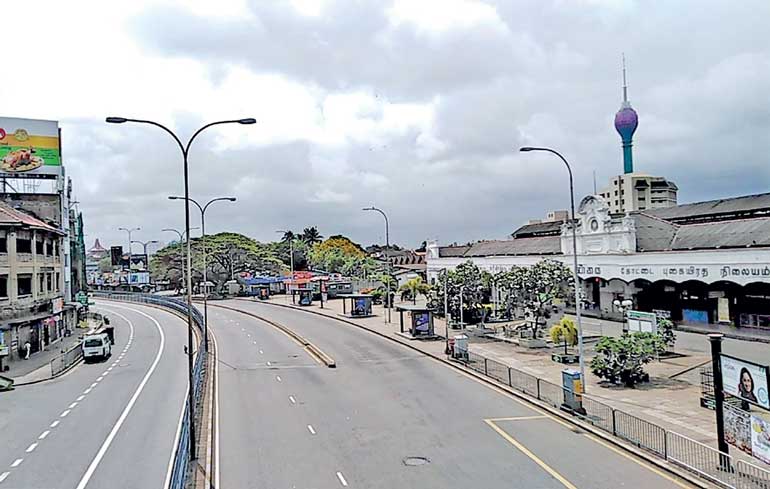Saturday Feb 14, 2026
Saturday Feb 14, 2026
Tuesday, 31 August 2021 02:06 - - {{hitsCtrl.values.hits}}

A day of lockdown in Sri Lanka causes a negative impact of Rs. 22.4 billion, or $ 112 million, according to the economic projection model developed by the Imperial College.
It estimates the 10-day lockdown as of 30 August to have had an impact of $ 1.12 billion, or 1.3%, of GDP (Rs. 224 billion) whilst a four-week lockdown till 18 September would cost $ 1.67 billion, or 1.9% (Rs. 334 billion). A six-week lockdown ending 2 October followed by gradual relaxation would cost the economy $ 2.22 billion, or 2.5%, of GDP (over Rs. 444 billion).
The estimate was shared by the Independent Technical Expert Group following its sixth meeting held last week.
The Group’s chair is WHO Representative to Sri Lanka Dr. Alaka Singh and its facilitator is WHO Consultant and WHO Director-General’s Special Envoy For COVID-19 Preparedness and Response for the South East Asia Region Dr. Palitha Abeykoon.
The Experts Group following the sixth meeting recommended that the ongoing lockdown should be extended till 18 September.
“Overall, global and local evidence indicates that economies bounce back quickly once stringencies are removed,” the Experts Group said.
It said maintaining stringency to reduce transmission, caseload and deaths will enable quicker economic recovery.
It also noted that the current classification of Sri Lanka is ‘Red’ which adversely affects tourism. It said the ‘Green’ status (UK) requires daily cases less than 950 and a test positivity rate less than 2.5%.
“Extending the stringency measures would reverse the current trajectory and move Sri Lanka towards ‘amber’ and achieving ‘green’ status by end of the year,” the Experts group noted.
Citing a Monash University study, the Experts Group said extending lockdowns past 31 August was projected to reduce deaths from COVID-19. If the lockdowns are extended to 18 September and 2 October respectively, 7,500 and 10,000 deaths can be prevented relative to a release of lockdown on 31 August.
In the first week of the latest quarantine curfew, a record 1,188 deaths and 34,504 new cases were reported. A further 9,208 persons tested positive over the weekend. Yesterday a further 4,562 active cases were detected bringing the total to 55,098. The death toll rose to a highest ever daily tally of 216 on Sunday increasing total fatalities to 8,991.
Health experts and civil society groups have criticised the Government for being less stringent in the current quarantine curfew phase though officials have insisted a complete lockdown isn’t possible given the need for essential services to operate.
The Experts Group listed crucial enabling factors as saving lives, key adjustments in service delivery to care for cases, effective triage system supported by health professionals, optimising the home management protocols and monitoring of hypoxia, accelerating vaccination, and targeting the vulnerable to be given the most effective vaccines.
Among recommendations to prevention of transmission are the extension of strict social measures to reduce transmission; crucial household and individual compliance; reduce mobility by better targeting the measures that should be tightened using mobility data from Google Maps, mobile phone data and Facebook data, to identify the most important measures and plan in advance for a systematic re-opening of sectors, regions, and a return of employment categories.
The Experts Group also recommended the need for establishing safety nets by strengthening social support systems by engaging with temples and religious groups, NGOs, civil society etc. (i.e. a national mobilisation effort) to overcome needs of lower income groups, led by the Government (and supported by development partners as needed).
Other members of the Experts Group are Consultant in Community Medicine and Former Chief Epidemiologist in Sri Lanka and College of Community Physicians in Sri Lanka President Dr. Nihal Abeysinghe; Public Health Specialist and Sarvodaya President Dr. Vinya Ariyaratne; Senior Professor of Pharmacology at the University of Kelaniya and Sri Lanka Association of Clinical Pharmacology and Therapeutics President Prof. Asita de Silva; Consultant Immunologist and Head of the Department of Immunology – MRI Dr. Rajiva de Silva; Centre for Clinical Management of Dengue and Dengue Haemorrhagic Fever Clinical Head, Consultant Paediatrician, Association of Medical Specialists President Dr. LakKumar Fernando; Consultant Neuro Physician and Sri Lanka Medical Association President Dr. Padma Gunaratne; Consultant Physician and University of Colombo Prof. Emeritus of Medicine Prof. Saroj Jayasinghe; Prof. in Medical Education at the Department of Medical Education at the Faculty of Medicine and SLMA Former President Prof. Indika Karunathilake; Professor and Department of Immunology and Molecular Medicine Head at Sri Jayewardenepura University Prof. Neelika Malavige;, University of Colombo Professor Emeritus, Public Health Expert and former WHO Malaria expert Prof. Kamini Mendis; School of Public Health Chair/Professor at The University of Hong Kong, Faculty of Medicine, Hong Kong Prof. Malik Peiris; Prof in Community Medicine – Faculty of Medicine at the University of Colombo Prof. Manuj Weerasinghe; National Institute of Infectious Diseases Consultant Physician and Past President of the College of Physicians Dr. Ananda Wijewickrama; Former Professor of Community Medicine at the Faculty of Medicine – University of Colombo Dr. Lalini Rajapaksa; and Professor of Psychiatry – Keele University, UK, Emeritus Professor of Global Mental Health – Kings College London, and NIFS Chair Prof. Athula Sumathipala; and several WHO officials.
